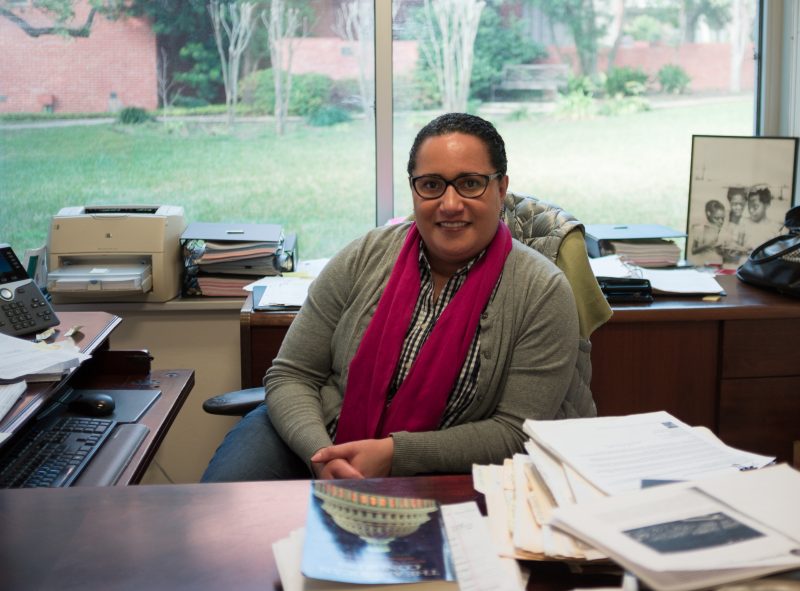Janaye is a convicted felon, but this is not her sole identity. Janaye is also a single mother who has been searching for sufficient housing for herself and her children for 10 years. According to the U.S. Department of Housing and Urban Development guidelines, Janaye was “rehabilitated.” Because it had been three years since Janaye had been convicted, she was eligible to live in public housing. However, local and public housing authorities continued to deny her application for public housing solely because she was a convict.
“I mean, everyone denied me. But once when I asked why, it was like they refused to give it to you straight, but I asked again, and they say, ‘Oh, it’s because you have this charge.’ Been going on nearly 10 years since my conviction, I’ve been good, no trouble, and yet I get rejected. Ten years of rejection,” Janaye said.
Keesha Middlemass, associate professor of political science, quoted previously incarcerated single mother Janaye, in her lecture on Jan. 24. Middlemass interviewed and studied individuals like Janaye, who struggled to re-enter society, find housing or employment and become more educated. In Middlemass’ book, “Convicted and Condemned: The Politics and Policies of Prisoner Reentry,” she focuses on the problems she found while working with individuals at a nonprofit GED program in Newark, New Jersey.
“Janaye’s experience, I found out, was the norm. Despite what the law says about being rehabbed, and you can prove yourself being rehabbed, most people convicted of a felony that I interacted with in Newark are homeless. Most participants have no family to house and support them,” Middlemass said.
When Middlemass began her research, she did so at another nonprofit program in Newark. This program was similar to the GED program she had worked with prior. While researching, Middlemass interviewed participants in the program and then researched the public policy on the issues she found were prevalent among released convicts. Middlemass shared this research and strategy with the students at her lecture, including first-year Madison D’iorio.
“I really enjoyed her style of research. She really focused it on talking to the people and instead of just looking at numbers and spreadsheets and statistics — she was actually in the field talking to individuals. I thought that was really powerful and gave us perspective we don’t always get,” D’iorio said
Middlemass concluded that there are two solutions that would help released convicts reintegrate into society. The first option is to provide educational opportunities to incarcerated individuals while they’re still in prison. The next is to stop asking individuals if they are a felon early on in the application process. She believes that if applicants were given a chance to get further in the interview process, they would be more likely to receive a job.
“It’s not fun being incarcerated. So the idea that you give them the opportunity — let’s say two years before they’re released — an opportunity to get their GED is cheaper in the long term because then they’re more likely, and I’m not saying everybody, but they’re more likely not to come back. My whole goal was to figure out what was going on, but then also be able to pinpoint changes that can be made,” Middlemass said.
Students at the lecture were receptive to the discussion Middlemass started on campus about the difficulties convicted felons face after they are released. Kailey Deluca, sophomore, thinks it’s an important issue for people to think about.
“I think educating people is the most important thing. You can’t do much about an issue if you don’t know it exists. I think trying to cultivate an atmosphere of empathy. I think rather than judging people for what they’ve done in the past, we should try to focus on what they are doing,” Deluca said.
Tigers for Liberty organized the lecture. D’iorio, the group’s event coordinator, thinks the event was a good opportunity for Trinity’s campus to come together.
“Criminal justice is something that everyone can be behind because we all feel that the system is broken, so it’s something that both liberals and conservatives can come together on. We might have different solutions for the problem, but we all recognize that there is a problem,” D’iorio said.







